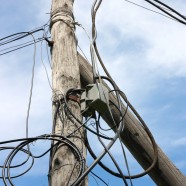
It’s not likely that your house will catch on fire from one tripped circuit breaker, but frequently overloaded electrical circuits can become a dangerous situation if they’re not corrected. Power surges are common in Florida because of the frequent electrical storms in the area, and any circuit that’s running up to capacity is in danger of overloading every time lightning strikes in the area. Preventing problems with your electrical equipment is a matter of preparing ahead of time, then keeping up with the quality of your equipment rather than letting it fall into disrepair.
Audit Your Equipment
If you’ve been tripping circuit breakers or if you have lights that dim when the refrigerator comes on, you know where the problems are in your house. Not having these problems doesn’t mean your electrical equipment is perfectly fine, though. Circuits may be running just on the edge of their limits, and one storm or an extra appliance being plugged in can be just enough to push them over the edge.
If you don’t have a circuit map of your home, take the time to create one of your own. Turn one breaker off, then move through the house and see what lights, outlets, and equipment doesn’t work. Mark that area on the map and indicate what breaker it’s connected to, then move on to another breaker. Map out your entire house in this manner.
Go through each individual circuit and unplug any appliances that aren’t currently in use. If you make coffee once a day, unplug the pot when you’re ready to head out in the morning. Work all day long? You don’t need the television plugged in, draining power while you’re gone. From phone chargers to blow dryers, most houses have dozens of items plugged in and draining power. Lighten the load on your circuits by unplugging yours.
Upgrade Your Electrical Installation
The equipment in your house uses electrical services in the most efficient way it can, but if you’re overloading the system, it’s probably time to upgrade and replace your older electrical equipment. The most obvious clue that you need an upgrade is having an older house with a fuse box instead of circuit breakers. Call an electrical contractor to replace this immediately, as older fuse boxes are almost invariably worn out, creating a fire hazard in your home.
If you’re constantly having to unplug appliances just to plug something else in, or if you’re relying on power strips and extension cords as a permanent solution, you need an upgrade on wiring and outlets. Adding outlets in logical places depending on your electrical usage can help to spread the load, but you may need additional upgraded wiring if your usage is heavy in one part of the house such as an office with multiple computers and large monitors. Your contractor will test your lines and tell you if you need an upgrade.
Schedule Regular Maintenance Appointments
Electrical maintenance isn’t just for repairing problems once they’ve happened. The best and least expensive way to deal with electrical problems is to prevent them before they happen. Scheduling regular maintenance appointments with an electrical contractor will eliminate most of the problems you have with wiring and circuits in your home. An electrical contractor will check wiring for wear and excess usage, look for possible improvements in your system, suggest ways to save power, and replace any equipment that’s beginning to wear out. You schedule regular dental and medical checkups for yourself; give your home the same consideration and have your electrical contractor check your wiring a couple times a year.

Recent Comments